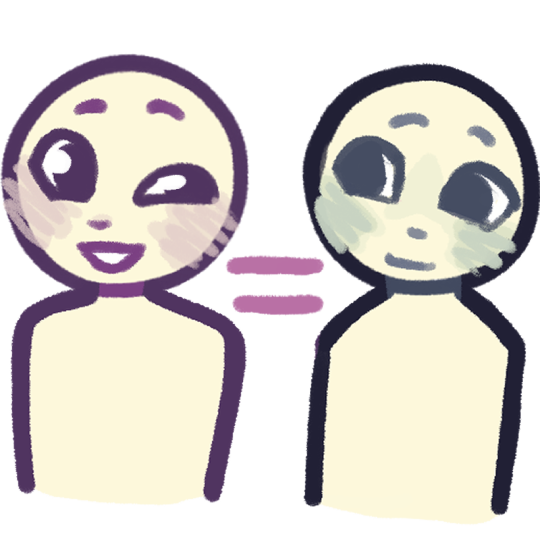system-error404-notfound
13K posts
Witch blog is @error404-witch-not-found
Don't wanna be here? Send us removal request.
Text

— pronunciation . { CELL - SER - AN }



CELSERAN. - a term for when you become attached to new people too quickly, & enjoy their presence based purely on vibe despite knowing nothing about them. this can be in a positive, neutral, negative, or complicated way. this may relate to the misinterpretation of friendships & how close people really are to you.
CELL + SER + AN , meaning attaching quicky

REQUESTED BY : @inhisbedroom
ALREADY COINED? CONSIDER THIS AN ALT FLAG / DEFINITION.
IDs IN ALT TEXT. PLAIN TEXT BELOW CUT.
pronunciation : ( cell - ser - an )
celseran. - a term for when you become attached to new people too quickly, & enjoy their presence based purely on vibe despite knowing nothing about them. this can be in a positive, neutral, negative, or complicated way. this may relate to the misinterpretation of friendships & how close people really are to you. cell + ser + an , meaning attaching quicky
requested by : @inhisbedroom already coined? consider this an alt flag / definition. ids in alt text. plain text below cut.
385 notes
·
View notes
Text
HAPPY!!!!!! MOTHER'S!!!!!!!!!!!!! DAY!!!!!!!!!!!!!!!!!
thank you so much to all the moms and motherly figures out there, I hope you have a wonderful day today. I love my mom so much
2K notes
·
View notes
Text

☆ACTIVITIES FOR INSYS PARTNERS!
okay i promise we'll make the new scp layout for our tumblr soon, it'll just be a while😭 anyways! we decided to make a list of things for insys partners to do when fronting (coming from two alters who've been together for over a year!)
to make things easier, i (🎩 proxy) will be writing in plain white, and my partner (🕯 proxy) will be using blue.
we have also made sure that polyamorous partners will also be capable of doing all the things in this list. whilst we are not poly ourselves, we understand others very well may be.
singing with eachother! be it by taking turns with each verse, picking songs for eachother to sing, singing different characters in songs with multiple characters, etcetera, singing is something we do a lot! (we did it a few minutes ago :D)
making a music playlist together! with us, we made a playlist together full of love songs/songs that remind us of eachother and the relationship we have
write poems for/with eachother! you could write separate poems, you could work together to make a poem, or you could write one stanza each about eachother until it's a full poem
helping eachother to get through work you have for the day. if you attend school, you could change who the main fronter is every lesson. if you have work, you could change every hour or so. overall, take fronting shifts, and when you aren't the main fronter, stay in co-front to talk to eachother. we find it makes the day pass far quicker whilst also motivating us. if you have a frontspace, you can also interact with eachother throughout the day/when you aren't the main fronter. with us, we'll occasionally share kisses, and since we have a sofa in our frontspace, we'll either sit next to eachother, or on the other's lap.
making food together! you could bake, cook, or do anything really :) a personal favorite of ours is sandwiches and soup!
watching something together. you could watch a tv show, a movie, a video, a series, anything that comes to mind. we personally enjoy watching analog horror together. and laughing when the other gets scared. that too.
playing games together is a good one! you could switch players every few minutes/hours depending on the game, or switch players every time you die. that or you can have one person play as the other talks to them/advises them on what to do (this goes for every activity!)
drawing yourselves together is a nice one aswell! you could draw yourselves together in an actual art piece, or just as doodles (we're planning on drawing ourselves as cats later so we can have matching profiles, tell us if you wanna see!) you can also draw eachother if you're fronting alone and are missing them
match profiles! if you use any logging/proxy tool, you can make your bios, layouts, banners, pfps and all that lot match :D we have matching layouts, banners, quotes, and plan on having matching profiles.
this list will grow when we think of more, have fun!
-🎩 & 🕯

67 notes
·
View notes
Note
Hey, can you make NPD emotes? :]
Gah this took me a few days I forgot what some of the things are
Hope these are what you were looking for 🌸uhh and some other requests are almost done
















Cant regulate emotions
I need space
Equal person
I like that (with a crown)
I like that (with a halo)
I'm not like them (with a crown)
I'm not like them (with a halo)
Joyous Chatter (with a crown)
Joyous Chatter (with a halo)
Narc Crash (with a crown)
Narc Crash (with a halo)
Narc High (with a crown)
Narc High (with a halo)
I care about them
I don't care about them

434 notes
·
View notes
Note
falling down a flight of stairs stimboard ?









46K notes
·
View notes
Text
i am full of love and also fatigue
67K notes
·
View notes
Text
[inhales]
[sighs]
[moves another playlist from the 'OCs' folder to the 'system parts' folder]
137 notes
·
View notes
Text
"why r u smiling at ur phone" bc my friebds 🌈🌈🥰🌞 and i love friend 😊😊😊🫂💞 Friends 👍👍🌈 And im Happy 😊😊🫂💞👍🌈
32K notes
·
View notes
Text
Rabbits Rabbits Rabbits
Reblog this on the first of the month for good luck all month long!
377K notes
·
View notes
Text
Fuck ableists. Hits every character ever with the npd beam
261 notes
·
View notes
Text
im so serious about this but if youre autistic and especially if youre chronically ill creative labour cannot be your only way to relax. working on a creative project is still working. take time to do nothing. its good for you i promise.
24K notes
·
View notes
Text
you’re not a failure because your disability makes it harder for you to study or work, or do any of the things you want to. respecting our own limits and boundaries is more important than relentlessly chasing after an impossible definition of success.
3K notes
·
View notes
Text

sorry to have to tell you this but if a stranger comes to your inbox or slides in your DMs asking you for your money with some sob story, no matter how tragic and convincing the story is, they are a scammer — especially if the story is obviously copied and pasted, formatted in the exact same way as the other 100 bots in your inbox
12K notes
·
View notes



